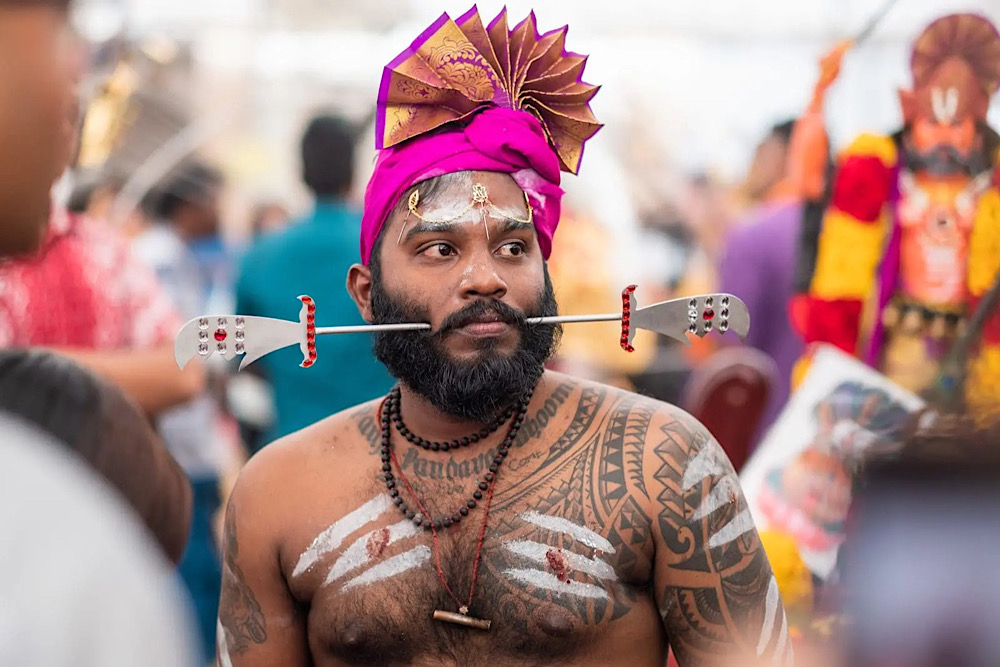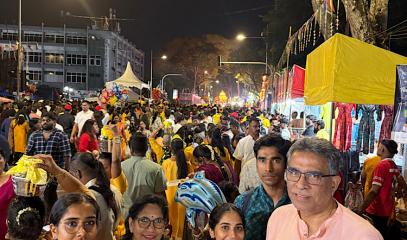Kuala Lumpur: Hindus celebrate Thaipusam, the festival of purification
For the festival of the god Murugan, symbolising the victory of good over evil, the faithful fast from food and drink. Among the practices is that of pricking oneself with metal hooks and spikes. During the 40 days of preparation, devotees bathe ‘only in cold water, sleep on the ground, pray, sing mantras and hymns and devote themselves to spiritual reading’.
Kuala Lumpur (AsiaNews) - ‘On Thaipusam day, devotees fast from food and drink and refrain from seeking pleasures. They also offer prayers and sacrifices in the 40 days leading up to the actual festival’ to “purify themselves,” says R Elangovan, a Hindu devotee, to AsiaNews on the occasion of the festival that is celebrated every year in Malaysia, the most important in all of Southeast Asia, with over 1.5 million people attending the event held at the Batu Caves temple in Kuala Lumpur alone.
‘Throughout the day the devotees - he continues - observe a strict vegetarian diet, abstain from smoking and consuming alcohol, while male devotees do not shave or cut their hair’. And during the 40 days of preparation, the devotees ‘bathe only in cold water, sleep on the ground, pray, sing mantras and hymns and devote themselves to spiritual reading’.
The annual Hindu festival of Thaipusam is celebrated on the first full moon day of the Tamil month of Thai, which coincides with the appearance of the star Pusam, from whose union the festival takes its name. According to legend, on this day the goddess Parvati gave her son, Murugan, the sacred spear, which he brandished against the demon Surapadman, defeating him, symbolising the victory of good over evil. During Thaipusam the faithful subject themselves to corporal ‘punishments’ in order to attract the attention of the god and ask for favours in return, as well as trying to improve their lives and refine the ‘tools’ of victory to embrace success in the material, emotional and spiritual realms.
On the day of Thaipusam, Hindu temples throughout Malaysia are transformed into an epiphany of spectacular sounds and images. The colours of the festival come to life, the drums and Indian clarinets give life to equally fascinating rituals, such as the trance dance of the devotees with their skin, tongue and cheeks pierced by small hooks called ‘vel’, reminiscent of the sacred spear of the deity Murugan. The faithful also carry pots of milk on their heads during the processions, as well as wooden or steel utensils called ‘kavadi’, a ceremonial act of carrying a physical weight on the head and shoulders in atonement for sins or to fulfil vows made to Murugan the previous year.
Although every Hindu temple in the country celebrates Thaipusam, the main places where it is celebrated are the Sri Subramaniam Swamy temple in Kuala Lumpur and the Arulmigu Balathandayuthapani temple in Penang. Both temples are located on a hill, while the one in Kuala Lumpur is known as ‘Batu Caves’, being a cave temple. Its long history can be traced back to the 18th century, when the Tamil merchant and philanthropist K. Thamboosamy Pillay promoted the cave complex as a place of worship for Hindus.
The temple was eventually dedicated to the deity Lord Murugan and was completed in 1891, while the annual Thaipusam celebrations began the following year, in 1892. Over the decades, the cave temple in Kuala Lumpur became an iconic symbol of the Thaipusam celebration among the global Indian diaspora and today it is remembered wherever there is a significant Tamil community. This includes countries such as India, Sri Lanka, Malaysia, Singapore, Mauritius, Fiji, some Caribbean islands and, to a lesser extent, the United States.








.png)










